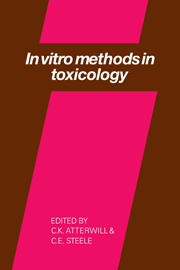Genetic toxicology
Published online by Cambridge University Press: 06 August 2010
Summary
INTRODUCTION Genetic toxicology is the study of the effect of chemicals on DNA, the unit of heredity, and the impact of this on mutation, a permanent heritable change in DNA. Many mutations are deleterious perhaps resulting in the inactivation of an enzyme or in change of cell function, but some may prove beneficial enabling the new cell or organism to survive in a changing environment.
The detection of chemicals that may be potential mutagens (mutagenic agents) is a rapidly expanding discipline relying on a variety of in vivo and in vitro assays some of which will be described in detail below. One reason for its wide acceptance in spite of the esoteric nature of the subject is that tests to identify mutagens are now frequently used to provide an indication of carcinogenic potential. The fact that the majority of mutagens are also carcinogens revived the somatic mutation theory of cancer proposed by Bauer and Boveri in the 1930's but which had not been substantiated by earlier genetic experiments.
The hypothesis was that the induction of cancer was the consequence of a mutation arising in somatic (non-germinal) cell tissue which led, at a later date, to uncontrolled cell division of the mutated cells to produce tumours and eventually cancer.
To understand the rationale linking tests for mutagenicity and cancer induction, a knowledge of DNA and the way this unique molecule operates is helpful.
- Type
- Chapter
- Information
- In Vitro Methods in Toxicology , pp. 299 - 318Publisher: Cambridge University PressPrint publication year: 1987



